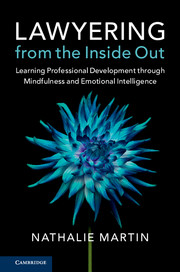 Lawyering from the Inside Out
Lawyering from the Inside Out from PART I - NURTURING YOUR BEST SELF
Published online by Cambridge University Press: 18 May 2018
Tear down this house. For under it lies a treasure far greater than you could ever imagine. Tear down this house, for a hundred thousand new houses can be built from the transparent yellow carnelian buried under it.
Rumi
You can certainly become a lawyer without becoming more familiar with yourself. People have been doing it for centuries. There is no doubt, however, that selfawareness is a trait we all value in others.
Today, many people expect their lawyers to be more interpersonally skilled than perhaps in the past. Rather than mere legal technicians, people expect lawyers to listen and act with humility, compassion, and an understanding of the human condition. New American Bar Association rules suggest that lawyers be trained in self-reflection, as well as interpersonal awareness and skill, yet most law schools still do not train lawyers in these essential skills. Lawyers with these skills will always be in high demand. This is because self-aware lawyers are better at resolving conflict, which is one of our main jobs in society.
William Ury of the Harvard Program on Negotiation and Harvard Negotiation Project calls the process of mindful self-awareness “getting to yes with yourself.” In his book by the same name, he explains the many benefits of mindful selfawareness:
The process of getting to “yes with yourself” not only makes it easier to resolve conflicts, but it also actually helps prevent conflicts from arising in the first place. By not reacting, by staying calm, and grounded, you will avoid being provoked and will be less likely to take attacks personally. You are far less likely to say or do things you will later regret. With an attitude of sincere respect and a genuine willingness to help address the needs of others, you will be able to resolve matters long before they escalate into serious disputes. You will get along naturally with others with a minimum of conflict.
This book, on the subject of attorney professional development through mindfulness and emotional intelligence, is designed to help you accomplish these goals and others. Through the practices outlined in these pages, we hope to help you reach the state described by Ury above. We also hope to help you experience less stress, become more focused, and eventually experience deep job satisfaction.
To save this book to your Kindle, first ensure no-reply@cambridge.org is added to your Approved Personal Document E-mail List under your Personal Document Settings on the Manage Your Content and Devices page of your Amazon account. Then enter the ‘name’ part of your Kindle email address below. Find out more about saving to your Kindle.
Note you can select to save to either the @free.kindle.com or @kindle.com variations. ‘@free.kindle.com’ emails are free but can only be saved to your device when it is connected to wi-fi. ‘@kindle.com’ emails can be delivered even when you are not connected to wi-fi, but note that service fees apply.
Find out more about the Kindle Personal Document Service.
To save content items to your account, please confirm that you agree to abide by our usage policies. If this is the first time you use this feature, you will be asked to authorise Cambridge Core to connect with your account. Find out more about saving content to Dropbox.
To save content items to your account, please confirm that you agree to abide by our usage policies. If this is the first time you use this feature, you will be asked to authorise Cambridge Core to connect with your account. Find out more about saving content to Google Drive.